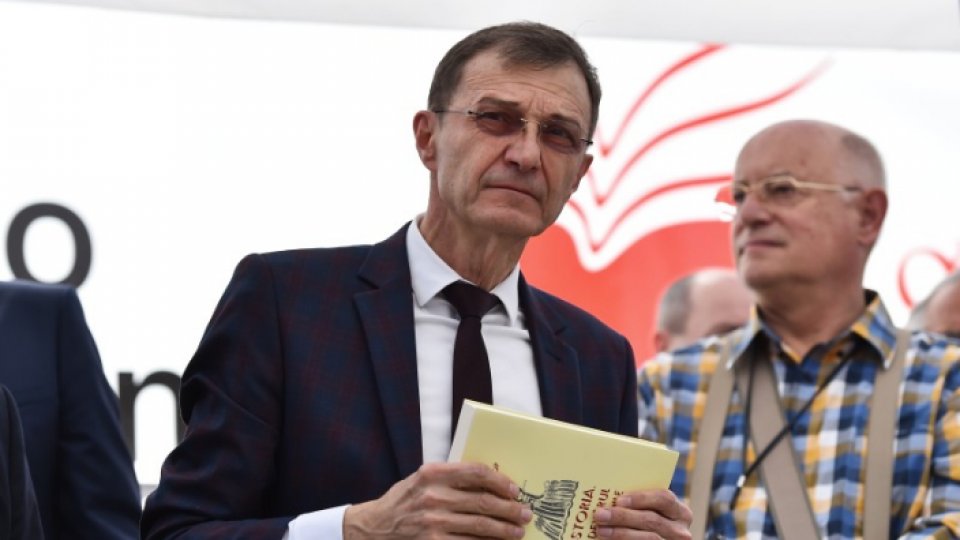Morning call - guest: the president of the Romanian Academy, Ioan Aurel Pop

Articol de Radio România Actualităţi, 04 Iunie 2020, 15:45
RRA (June 4, 8:32) - Host: Today marks the 100th anniversary of the conclusion of the Peace Treaty between the Allied Powers and Hungary in Trianon, France, which marked the end of the Austro-Hungarian Empire. The international recognition of the union of Transylvania, Banat, Crisana and Maramures with Romania entered into force on July 25, 1921. In Romania, Trianon Treaty Day is established by law, a law that has not yet been promulgated by President Klaus Iohannis. In direct contact with us is the university professor doctor Ioan Aurel Pop, the rector of the Babes-Bolyai University of Cluj Napoca and president of the Romanian Academy. Good morning!
Ioan Aurel Pop: Hello! Good morning, to you and the listeners!
Host: We would like a short history lesson from you, but one which for many can be a rethinking of history knowledge. What do we need to know about the Treaty of Trianon?
Ioan Aurel Pop: Yes, it is a hot topic today. In my opinion, when we talk about the new architecture of Central and South-Eastern Europe after the First World War, it is absolutely mandatory to make the difference between factual and legal realities. In fact, the old order of this region collapsed in 1918, not in 1920. In 1918 four empires fell, new states were formed, others were completed according to ethnic and national criteria, and the cause of this huge change was, without a doubt, the struggle for liberation, for the national emancipation of the people, which began in the eighteenth century and then intensified after 1800. The occasion for change was, of course, the First World War, or the Great War, which favored the fulfillment of the will of the people in the context of the central powers being defeated, and later the new order was in fact enshrined in an order of law in 1919-1920 through the treaties of Paris. The Trianon is an episode of these treaties, but for Romanians, Czechs, Slovaks, Croats, the climax of these changes was the autumn of 1918, and the year 1920 meant only, I repeat, the internationalization of these realities. In the vision of these peoples, it was not the great powers that created the united Romania or Slovakia within Czechoslovakia, or Croatia within the Kingdom of Serbs, Croats and Slovenes, but these peoples who somehow took their fate into their own hands. Moreover, internationally, through the American President Woodrow Wilson, these achievements were somehow established, they were also legitimized when the principle was issued, the international recognition of the principle of the people's struggle for self-determination. Therefore, Trianon is of extraordinary importance, because it created the order of fact through an order of law. And here I think there is a different interpretation of some members of the Hungarian elite, who see the Trianon as a decisive factor in the new architecture and also of these people I was talking about, including the Romanians, who emphasize the Trianon as a legislation of previous achievements.
Host: So can we talk about the effects of the Treaty of Trianon?
Ioan Aurel Pop: Of course! These effects are still seen today because, fortunately, the western border established then by the Treaty of Trianon has remained valid throughout this hundred years, it has been confirmed several times and therefore whether 100 years is something in history, then it means that the will of the people living in the Austro-Hungarian Empire was legitimate and lasting, in the sense that it was recognized. So, these people did nothing against the course of history, because the provinces that broke away from Hungary or the countries that broke away from Hungary, part of Austria-Hungary, had non-Hungarian majorities and a recognized principle was respected at international level.
Host: You said earlier that the Treaty of Trianon is an episode of primarily legal significance, but a sensitive topic of discussion for the Hungarian people. How did you get here?
Ioan Aurel Pop: The Hungarian people of course suffered a special trauma, because they lost the so-called historical Hungary or the crown, the Hungary of St. Stephen's crown, this tradition of a Great Hungary suffered a death blow. Two thirds of the historical territories inhabited mostly by Slovaks, Croats, Romanians, even Serbs in the case of Vojvodina, as majorities, were lost and the Hungarian elite from then until today, with certain nuances, accentuated this tragedy or as some call it, the historical catastrophe from Trianon.
It is more of a sentimental-historical vision than a realistic-legal one.
Host: How could the passions in this discussion of the Treaty of Trianon be removed, Mr President? Can a consensus ever be reached?
Ioan Aurel Pop: I think that it would be possible to reach, if not a perfect consensus, at least a rapprochement of visions, if political factors did not intervene. Unfortunately, in Romania sometimes, and in Hungary especially now, in these years with the government that Hungary has, the divisions are accentuated. But, fortunately, the younger generation is more pragmatic, more realistic, thinking of a united Europe, even if we do not have very optimistic perspectives here at the moment. It is part of history, the borders are spiritualized as Titulescu said, the free movement of ideas, of people, of the labor force is somehow established and I don't think it is a problem of conflict. The conflict is maintained out of political interests, in my opinion.
Host: Thank you for all these clarifications.
Translated by: Radu Matei














